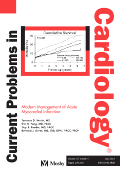
CURRENT PROBLEMS IN CARDIOLOGY
Scope & Guideline
Exploring the Frontiers of Cardiac Research
Introduction
Aims and Scopes
- Clinical Management of Cardiovascular Diseases:
The journal emphasizes research related to clinical practices for managing various cardiovascular conditions, including heart failure, myocardial infarction, and arrhythmias. It highlights studies that evaluate treatment protocols, medication efficacy, and patient outcomes. - Epidemiological Insights:
A significant focus is placed on understanding the epidemiology of cardiovascular diseases, including risk factors, prevalence, and outcomes in different populations. The journal publishes studies that analyze trends related to cardiovascular health across demographics. - Innovative Technologies and Interventions:
The journal explores advancements in medical technology and interventions, such as transcatheter aortic valve replacement and catheter-based therapies. It aims to inform clinicians about emerging techniques and their implications for patient care. - Health Disparities and Social Determinants:
Research addressing health disparities in cardiovascular care, particularly concerning race, ethnicity, and socioeconomic status, is a core area of focus. The journal aims to shed light on how social determinants affect cardiovascular health outcomes. - Integrative Approaches in Cardiology:
The journal increasingly emphasizes multidisciplinary approaches to cardiovascular care, including the integration of pharmacotherapy, lifestyle interventions, and psychological support in management strategies.
Trending and Emerging
- Telemedicine and Remote Monitoring:
The rise of telemedicine has transformed cardiovascular care, particularly in the wake of the COVID-19 pandemic. Research on the effectiveness of remote monitoring and telehealth solutions for managing cardiovascular conditions is increasingly prominent. - Artificial Intelligence and Machine Learning Applications:
The integration of artificial intelligence and machine learning in cardiology is a rapidly growing area of research. Studies exploring predictive analytics, diagnostic tools, and personalized treatment plans are on the rise. - Mental Health and Cardiovascular Disease Connections:
There is an emerging focus on the interplay between mental health conditions, such as anxiety and depression, and cardiovascular diseases. Research is increasingly examining how psychological factors impact cardiovascular health and treatment outcomes. - Novel Therapeutics and Drug Development:
There is a growing interest in innovative therapies, including SGLT2 inhibitors and GLP-1 receptor agonists, and their implications for cardiovascular health, particularly in patients with comorbid conditions like diabetes. - Genetic and Molecular Insights in Cardiovascular Disease:
Research exploring genetic predispositions and molecular mechanisms underlying cardiovascular diseases is trending. This includes studies on gene therapy, biomarkers, and personalized medicine approaches.
Declining or Waning
- Traditional Cardiac Rehabilitation:
Research specifically focused on traditional cardiac rehabilitation methods has decreased, possibly due to a shift towards more innovative and technology-driven rehabilitation approaches that incorporate telehealth and remote monitoring. - Surgical Interventions Compared to Non-Invasive Treatments:
There is a waning focus on comparing surgical interventions with non-invasive treatments, as the field increasingly emphasizes minimally invasive techniques and their outcomes over traditional surgical methods. - Pharmacological Studies of Established Medications:
The volume of studies focused solely on the efficacy of well-established cardiovascular medications, such as traditional beta-blockers and statins, is declining as newer therapies and personalized medicine approaches gain prominence. - Generalized Risk Factor Studies:
Research that broadly addresses cardiovascular risk factors without a specific focus on innovative treatment or intervention strategies is becoming less common, as studies increasingly target specific populations or emerging risk factors.
Similar Journals

Journal of Cardiology
Innovating solutions for a world of cardiovascular challenges.Journal of Cardiology, published by ELSEVIER, stands as a prominent resource in the field of cardiology and cardiovascular medicine. With a rich history since its inception in 1987, this peer-reviewed journal aims to disseminate cutting-edge research that enhances the understanding and treatment of cardiovascular diseases. Its 2023 ranking places it in the Q2 category within its discipline, reflecting its significance and impact, as evidenced by a Scopus rank of #123 out of 387 journals, positioning it in the 68th percentile of its field. The journal is headquartered in Japan, providing a unique perspective on cardiological advances relevant not only to the Asian continent but also globally. Though it does not currently offer open access, the Journal of Cardiology remains a vital institutional resource for researchers, clinicians, and students seeking to push the boundaries of cardiovascular science and improve patient outcomes.

Frontiers in Cardiovascular Medicine
Connecting Global Insights for Heart Health Advancement.Frontiers in Cardiovascular Medicine is a leading open-access journal published by FRONTIERS MEDIA SA, dedicated to advancing research in the field of cardiology and cardiovascular medicine. Since its inception in 2014, the journal has become a vital platform for the dissemination of high-quality research, boasting a commendable Q2 rank in the 2023 category for Cardiology and Cardiovascular Medicine. With a focus on promoting innovative studies and clinical insights, Frontiers in Cardiovascular Medicine facilitates open access to its content, allowing researchers, healthcare professionals, and students from around the globe to engage with the latest findings which are critical for the advancement of cardiovascular health. The journal's significant presence in the academic landscape, as indicated by its Scopus ranking (161/387 and 58th percentile), underscores its importance as a research outlet in this essential field. Located in Lausanne, Switzerland, the journal continues to support the global cardiovascular community by encouraging collaboration and knowledge sharing to address the challenges faced in cardiovascular medicine today.

Revista de la Federacion Argentina de Cardiologia
Elevating standards in cardiology one study at a time.Revista de la Federacion Argentina de Cardiologia is a vital publication in the field of Cardiology and Cardiovascular Medicine, providing a platform for researchers and healthcare professionals to share significant findings and innovative concepts since its inception in 2012. Published by the Federacion Argentina Cardiology, this journal specifically addresses contemporary issues and advancements within cardiology, contributing to the scholarly dialogue essential for improving cardiovascular health. Despite being categorized in the Q4 quartile for 2023 and presently ranking #358 out of 387 in its field, the journal remains committed to fostering academic inquiry and disseminating valuable research for both local and global audiences. Although it is not an open-access journal, it strives to balance accessibility with rigorous academic standards, ensuring quality contributions that are critical for practitioners and students alike. The journal’s ongoing evaluation and adaptation in the ever-evolving landscape of cardiology underscore its importance in advancing cardiovascular science and practice.
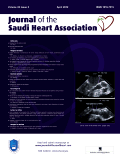
Journal of the Saudi Heart Association
Transforming Heart Health Through Scholarly ExcellenceThe Journal of the Saudi Heart Association is a prominent scholarly publication dedicated to advancing knowledge in the fields of cardiology and cardiovascular medicine. Published by DIGITAL COMMONS BEPRESS, this open-access journal has been serving the global community since 2009, providing a vital platform for researchers, practitioners, and students interested in the latest developments in heart health and disease management. With an ISSN of 1016-7315 and a growing repository of knowledge alongside an E-ISSN of 2212-5043, the journal showcases an array of peer-reviewed articles that contribute to the understanding of cardiovascular conditions. Although categorized in the Q4 quartile for 2023, it remains committed to offering valuable insights, particularly within the constraints of the 29th percentile rank specified by Scopus. As the journal converges towards 2024, it continues to foster collaboration, innovation, and inquiry within the Saudi Arabian and international medical communities.
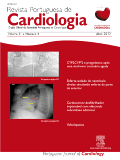
Revista Portuguesa de Cardiologia
Exploring innovative solutions in cardiology since 1970.Revista Portuguesa de Cardiologia, published by Elsevier España SLU, stands as a pivotal resource in the realm of Cardiology and Cardiovascular Medicine. With its origins tracing back to 1970, this journal has cultivated a robust academic presence, achieving a 2023 Q3 ranking in its category, and currently holding a position of #220 out of 387 on the Scopus rankings, placing it within the 43rd percentile of its field. This open access journal, available since 2011, aims to disseminate high-quality research and insights relevant to contemporary cardiovascular issues. Its commitment to accessibility and knowledge exchange enhances its importance for clinicians, researchers, and students alike, fostering a more informed community in the fight against cardiovascular diseases. Operating from its base in Barcelona, Spain, the journal welcomes contributions that further the understanding and treatment of heart conditions, contributing significantly to the advancement of cardiovascular health.
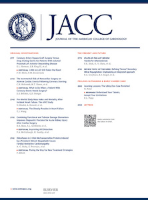
JOURNAL OF THE AMERICAN COLLEGE OF CARDIOLOGY
Fostering Collaboration for Global Cardiovascular HealthJOURNAL OF THE AMERICAN COLLEGE OF CARDIOLOGY, the esteemed publication of Elsevier Science Inc, stands as a premier platform for advancing knowledge in the field of cardiology and cardiovascular medicine. With an impressive impact factor reflecting its prominence—ranked Q1 in its category for 2023 and occupying the 4th position out of 387 in the Scopus listings, firmly placing it in the 99th percentile—this journal is essential for researchers, clinicians, and students alike. Since its inception in 1983, it has continuously provided a vital space for high-quality research and innovative clinical practices, driving forward our understanding of cardiovascular health. While access options are not open, the value of the cutting-edge articles published here cannot be overstated, as they foster collaboration and inform better patient care across the globe. As part of its ongoing commitment to excellence, the journal solicits submissions of original research, reviews, and clinical studies that contribute meaningfully to the field and engage its diverse readership.
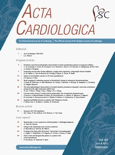
ACTA CARDIOLOGICA
Illuminating the path to better cardiovascular care.ACTA CARDIOLOGICA is a distinguished journal published by TAYLOR & FRANCIS LTD, focusing on the dynamic fields of Cardiology and Cardiovascular Medicine. Established in 1946, the journal has maintained a significant presence in the academic community, providing a platform for cutting-edge research and clinical studies that aim to address challenges in cardiovascular health. With its Q3 rating in both Cardiology and General Medicine categories, it showcases a robust compilation of articles that reflect the evolving landscape of cardiac care. Although ACTA CARDIOLOGICA is not an Open Access journal, it continues to serve a vital role for researchers, professionals, and students dedicated to advancing knowledge in cardiovascular health. This journal, with an ISSN of 0001-5385 and E-ISSN of 1784-973X, is a critical resource for those looking to stay updated on the latest developments and practices in the specialization, contributing significantly to the field until 2024 and beyond.
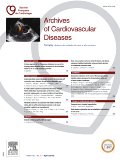
Archives of Cardiovascular Diseases
Elevating knowledge in cardiovascular diseases for better outcomes.The Archives of Cardiovascular Diseases, published by Elsevier Masson, stands as a leading journal in the field of cardiology and cardiovascular medicine, with an impressive impact factor that underscores its relevance and influence. This esteemed journal, recognized in the Q2 category for both cardiology and miscellaneous medicine, aims to disseminate groundbreaking research, innovative methodologies, and clinical advancements that can shape the future of cardiovascular health. With its diverse array of open access options, researchers and students alike have the ability to engage with high-quality content, ensuring that cutting-edge findings are accessible globally. Since its inception in 2008, the journal has actively contributed to the advancement of knowledge in cardiovascular diseases, fostering collaboration among clinicians, researchers, and educators. Headquartered in Paris, France, Archives of Cardiovascular Diseases remains committed to enhancing our understanding of cardiovascular health and improving patient outcomes worldwide.

Netherlands Heart Journal
Elevating Standards in Cardiology with Cutting-Edge FindingsNetherlands Heart Journal is a premier academic publication dedicated to advancing knowledge in the field of cardiology and cardiovascular medicine. Published by BOHN STAFLEU VAN LOGHUM BV, this journal has established itself as a critical platform for researchers, professionals, and students seeking to explore groundbreaking findings and innovative practices in cardiovascular health. With an ISSN of 1568-5888 and E-ISSN 1876-6250, the journal boasts a respectable Q2 ranking in the Cardiology and Cardiovascular Medicine category, placing it in the top half of its field according to the 2023 quartiles. The Scopus ranking places it 130th out of 387 in the relevant category, indicating a commendable percentile rank of 66th, which attests to its influence and quality of published research. Spanning from 2005 to 2024, the journal endeavors to include a diverse array of topics, encompassing clinical practice, technological innovations, and public health considerations related to cardiovascular diseases. Researchers and practitioners are encouraged to engage with the journal's robust content, contributing to and benefiting from the collaborative effort to enhance cardiovascular health worldwide.

American Journal of Cardiovascular Drugs
Pioneering Research in Cardiovascular PharmacologyAmerican Journal of Cardiovascular Drugs, published by ADIS INT LTD, is a premier peer-reviewed journal dedicated to the field of cardiology and cardiovascular medicine. With an ISSN of 1175-3277 and an E-ISSN of 1179-187X, this esteemed journal has established itself as a crucial platform for disseminating high-quality research since its inception in 2001. It holds a significant position in its domain, ranking in the second quartile (Q2) across several categories including Cardiology, Medicine (miscellaneous), and Pharmacology (medical) for the year 2023. With its Scopus ranks placing it in the 81st percentile for Cardiology and 77th percentile for Pharmacology, the journal is highly regarded among professionals, researchers, and students alike. While it is not an open-access journal, its comprehensive articles and systematic reviews provide an in-depth exploration of cardiovascular drug therapy, therapeutic advancements, and clinical practices, making it an invaluable resource for anyone invested in the future of cardiovascular health.